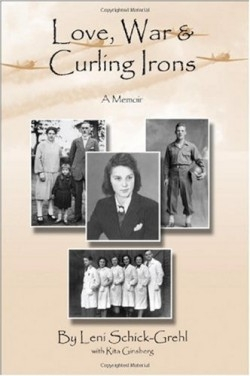Love, War & Curling Irons
As warplanes flew overhead civilians continued their daily activities: they went to work they fell in love. War was only one aspect of life. Leni Schick-Grehl’s biography includes the highlights of her life emphasizing experiences in her native country of Germany and as a new U.S. immigrant.
Leni’s first love Franz Gesenhaus died when he was hit with shrapnel during mandatory service in Hitler’s army. In 1944 when Leni was twenty incendiary firebombs destroyed Duisburg her hometown and made her family’s apartment unlivable. After walking riding freight trains and catching rides in English army trucks to reach Bremen Leni discovered that her maternal grandparents had survived the war. They introduced her to Fred Grehl an American soldier of German ancestry. As Fred’s wife in the United States Leni learned English. Her difficulty with nuances of meaning became apparent when she spoke to a doctor about her baby’s ears: “She seems to have a lot of lard in them” she said.
A map of Germany enables readers to locate significant places especially Duisburg and Bremen. Black-and-white photographs of Leni Fred and family members appear throughout the book and on two pages dedicated to photos.
Leni worked for three years as an apprentice at Werner Ihnen’s beauty salon in Duisburg Germany and continued working there after her apprenticeship was completed. She graduated from a beauty trade school with the top final-examination score and later worked at a hair salon in Bremen-Aumund. After becoming a United States citizen she worked at Audrey’s Beauty Salon in Paw Paw Michigan for twenty-five years.
Despite its design flaws including the lack of a title page this well-organized book provides a good view of German life in the World War II era. Captions clearly identify the photos which enhance nearby text. For example a photo of the S.S. Marine Flasher is accompanied by the description of Schick-Grehl’s voyage to the United States on that ship.
Unfortunately the book includes some awkward phrasing. For example “in” would have been a better initial preposition in Schick-Grehl’s statement about her mother: “By 1953 she came to America by herself and stayed with us for a few months while my father attended to his store.” Many German sentences and phrases with translations add flavor and acquaint readers with that language. Schick-Grehl writes about several girls from her Berufschule (trade school) who accompanied her to a Mardi Gras parade.
This book will interest adults who wish to learn about German history World War II and US immigration from a personal standpoint and adults who have experienced war or are immigrants. Good and bad aspects of life are intertwined here. The war was horrifying but because of it Schick-Grehl met her wonderful husband.
Disclosure: This article is not an endorsement, but a review. The publisher of this book provided free copies of the book and paid a small fee to have their book reviewed by a professional reviewer. Foreword Reviews and Clarion Reviews make no guarantee that the publisher will receive a positive review. Foreword Magazine, Inc. is disclosing this in accordance with the Federal Trade Commission’s 16 CFR, Part 255.

